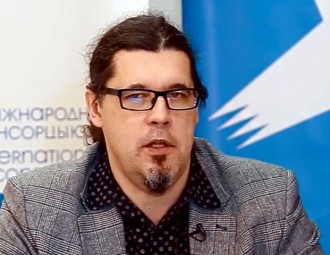Gintautas Mažeikis: Political sphere and arena ratio in light of information wars and propaganda

Modern political strategists got caught in their own trap. Society’s inertia makes them depend on the performative nature of political life and participate in the “race of information armory”.
In his video report, philosopher and professor of Vytautas Magnus University (Kaunas) Gintautas Mažeikis discusses several concepts that have been a part of the European social and philosophical thought for quite a time; however, the analysis of today’s transformations (or mutations?) of political sphere and political arena, despite its academic description, unintentionally make one think about the horror movies and anti-utopian novels.
Having started with simple concepts of a “political sphere” as a “sphere of tension of public interests” and “political arena” as a main scene, manifestation, and collisions of these interests, professor Mažeikis briefly mentioned the historical process of “sovereignties’ erosion”. This process is related not only to the delegation of some state’s authorities to super-state institutions, but also with the “penetrability” of political spheres caused by the appearance of transnational corporations and development of communication technologies. Thus, now the boundaries of a political sphere and the boundaries of the state almost never coincide, which makes us change the evaluation system and appraise the “size” of the country differently – not by the number of people and territory. The question “Which country is bigger now: Israel or Russia?” doesn’t seem absurd anymore, and the answer to it doesn’t seem that obvious.
A political sphere depends on many variables, among which are conflicts and actions at the “arenas”. But since the boundaries of the political field ceased to coincide with the boundaries of the countries, it is quite logical that the “arenas”, communicative practices, and propaganda techniques might also be brought out of these boundaries. Ways of stimulation and infection of political space and sign systems are also changing: “memes”, “metaphors”, “prehistory”, and “new ideologies” are only few of the elements of a “new communication order” that makes efficient interventions to the “alien” political spheres possible. All that is a serious challenge not only to the state, but also to the international legal mechanisms that always aim at territoriality and sovereignty, to delegation of sovereignty, and even to criticism of such delegation – but in a physical, not information dimension!
A parallel and no less important process is the appearance and quick spreading of such phenomenon of public life as “scene” – a certain state of society, a different mechanism of social and political reality generation. Back in the 60s of the 20th century a French philosopher Guy Debord issued a fundamental work “The Society of the Spectacle”; a bit later, in late 1980s a follower of Pierre Bourdieu Patrick Champagne conducted a large-scale research of how representations (product of media activity) cease to be a reflection or even a distortion of manifestations that happen in reality, but start forming the reality. Manifestation is a phenomenon of an “arena”; “scenes” are needed for representations. Informational reality of the modern society suggests that “scenes” have gradually forced out “arenas”; from now on representations shouldn’t somehow correlate outside the virtual space and well-designed “scenes”. The whole class of political techniques became possible and efficient at the expense of society’s spectaclization.
And here is where we approach the “horror” genre. Having launched the process of constant virtual delivery of “gore fest" in the modern society, the spectacle directors got caught in their own trap. The consumer society has its own inertia; it doesn’t consume everything it can. It has its own consumption skills; so it’s quite hard to shape the demand for this or that type of product. Besides, the habit to consume certain images lessens the audience’s ability to imagination; it stops understanding other phenomena but for those that it got used to. Thus, puppeteers start depending on the "society of the spectacle" market.
Not only the "society of the spectacle" gradually becomes capable of “self-reproduction” and “self- spectaclization”; consumption makes people euphoric, while modern technologies that are available for consumers allow them to reproduce the “spectacle” independently, regardless of huge corporations and regardless of political consultants, who strive to rule the world through the organization of different “scenes”. And the only way-out for the new “Messiahs”, who are trying “to awake the society from sleep”, is to return the arena, a real, not virtual action. However, when society is driven to such a state, arenas return in a very brutal way. Civilization skills and abilities to stimulate the society are lost; real blood and terror are used instead.
“And the problem lies not only in restoring the arenas and keeping a balance between manifestations and representations, between a political action and a spectacle, but also in making this return more or less civilized”, - claims professor Mažeikis in the end of his report.
You can watch the full video report (in Russian) here.
-
03.01
-
07.10
-
22.09
-
17.08
-
12.08
-
30.09



























